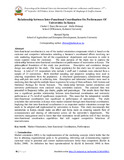Relationship between Inter-Functional Coordination On Performance Of Universities In Kenya
Date
2019-09Author
Chebet, J.
Muhanji, Stella
Njehia, Bernard
Bowen, Daisy
Metadata
Show full item recordAbstract
Inter-functional coordination is one of the market orientation components which is based on the
customer and competitor information entailing a business’s coordinated efforts involving not
only marketing department, but all the organizations’ departments and resources in order to
create superior value for customers. The main purpose of the study was to analyse the
relationship between inter-functional coordination on performance of universities in Kenya. The
philosophical foundation of this study was positivism. Descriptive and correlation designs
design was adopted for the study. The target population for this study was 63 universities in
Kenya. A total of 115 respondents who include 3 staff and 2 students were selected from a
sample of 23 universities. Both stratified sampling and purposive sampling were used in
selecting respondents from the population. A structured questionnaire, administered through
drop and pick was used in collecting data. Descriptive and inferential statistics were used in
analysing data through the multiple linear regression by using of Stata software, SAS System and
Statistical Package for Social Sciences. The relationship between market orientation and
university performance were analysed using correlation analysis. The analysed data was
presented in frequency tables, pie charts, graphs and percentages. The results show that there
was a significant positive relationship between inter-functional coordination and university
performance at 1% level of significance respectively. This mean that the independent variable
inter-functional coordination was significant in performance of universities. The study
concludes that universities in Kenya were market oriented through inter-functional coordination.
Implying that that inter-functional coordination is an important market orientation concept that
needs to be adopted and implemented by universities in Kenya. This study recommends that
universities in Kenya should make an effort and focus more on ensuring smooth flow of
communication and sharing of information across all the university’s departments. The
university management need to know that their institutions would perform well if they develop
inter-functional coordination capabilities that will support competitive behaviour of
innovativeness.

